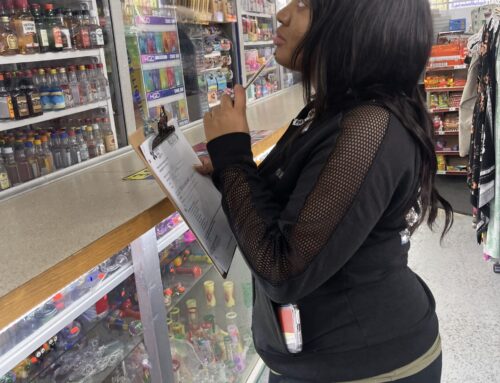Despite the challenges that 2021 brought, our public health partners remained committed to building healthier, more equitable communities.
We’d like to recognize our partners for the following accomplishments in 2021:
- Arizona Office of the Attorney General reinitiated tobacco enforcement inspections this year using the Tobacco Enforcement System (TES), created out of Arizona’s partnership with Counter Tools. Arizona filed suit to hold JUUL accountable for its role in youth tobacco initiation, and recently secured a settlement requiring JUUL to pay $14.5 million, most of which will be used to fund programs to stop youth vaping.
- Bureau of Tobacco Free Florida, along with local providers across the state, creatively navigated newfound preemption on local regulation of tobacco sales and marketing. They found new ways to make progress in tobacco prevention and prepared to launch a comprehensive new data collection effort for both general store assessments and tobacco-related Assurances of Voluntary Compliance through Counter Tools’ Point-of-Sale Toolkit software platform. Florida is also getting a clearer picture of the tobacco retailer landscape in their state by completing all mergers in POST to compile a clean, canonical retailer list.
- CADCA’s Geographic Health Equity Alliance continues to offer evidence-based training and support to help partners across the country reduce geographic health disparities. GHEA co-led a collaborative for tobacco and cancer control programs, teaching them to apply the principles of policy surveillance to K-12 tobacco free school policies in their states. GHEA is also supporting the process of drafting competencies for place-based public health professionals.
- California Department of Justice successfully launched a new statewide licensing and enforcement system for tobacco control that will federate local, state, and federal data from a growing number of agencies across the state.
- Charleston Center completed a community scan to assess community needs and resources for addressing opioid and stimulant misuse in zip codes across Charleston County, SC that had a high level of overdoses.
- Community Advocates Public Policy Institute conducted a countywide, volunteer-based data collection effort in Milwaukee County, WI to better understand the availability of tobacco and alcohol products in the retail environment using the Counter Tools’ Store Audit Center. Community Advocates strengthened community-centered public health work by collaborating with partner organizations in Milwaukee.
- Indiana Department of Health-Tobacco Prevention and Cessation kickstarted a new cycle of point-of-sale efforts in counties across the state with program funding and support. Indiana supported local partners in increasing their community education efforts, leading community conversations about the impact of tobacco across the state, and utilizing Counter Tools-created communication materials (including educational packets and static maps) to increase community knowledge on why tobacco prevention matters.
- Kansas Department of Health and Environment introduced grantees and youth councils to the concept of point-of-sale commercial tobacco prevention and control. Kansas also supported grantee efforts to implement or strengthen local tobacco retail licensing ordinances.
- Maryland Department of Health’s local health departments completed over 1,200 enforcement and 3,600 education visits using Counter Tools’ Point-of-Sale Toolkit. Maryland also identified and reported tobacco retailers with multiple sale to minor violations within a one-year period.
- Massachusetts Tobacco Cessation & Prevention Program strengthened retailer violation tracking capabilities in Counter Tools’ Point-of-Sale Toolkit and completed over 1500 enforcement and 3800 inspection visits by Board of Health staff.
- Minnesota Department of Health supported cities and counties in a statewide store assessment effort to document the marketing and selling of tobacco and food products in the retail environment using the Counter Tools’ Store Audit Center. Minnesota advanced policy efforts across the state, including passing flavored tobacco product bans in cities within Hennepin County, enacting a tobacco endgame policy in Bloomington, and passing comprehensive pricing, flavor and density-related retail tobacco restrictions in St. Paul.
- Nebraska Department of Health and Human Services successfully completed retailer assessments in 12 counties across the state for the first time in more than two years utilizing Counter Tools’ Point-of-Sale Toolkit.
- New Jersey Prevention Network trained public health leaders from 10 regional tobacco collaboratives on local point-of-sale tobacco control policy. New Jersey also began collaborating with Counter Tools to develop a toolkit to equip municipalities with key public health information about cannabis and other THC-derived products.
- Oregon Health Authority pioneered a strong model of statewide tobacco retail licensing, supported local level pioneering work in prohibiting the sale of flavored tobacco products, and prohibited price discounts and coupons. Oregon also created opportunities for creative, community led work to address the root causes of the commercial tobacco use epidemic.
- Smokefree SC and the SC Department of Health and Environmental Control successfully stopped a preemption bill from passing which would have stifled point-of-sale tobacco control efforts at the local level. South Carolina provided grant funding to strengthen local efforts in tobacco prevention campaigning and supported local advocates in laying the groundwork for tobacco retailer licensing at the county level.
- Virginia Department of Behavioral Health and Developmental Services continued to educate decision makers on the value of statewide tobacco retail licensing and completed merchant education with over 1,600 retailers across the state using Counter Tools’ Point-of-Sale Toolkit (POST). Virginia regularly cleaned and updated their statewide list of more than 16,700 alcohol retailers to more accurately visualize the alcohol retail environment across the state using Counter Tools’ Store Mapper.
We are thankful for your partnership and commitment to healthier, more equitable communities. Cheers to a new year ahead of working together to support place-based public health!



